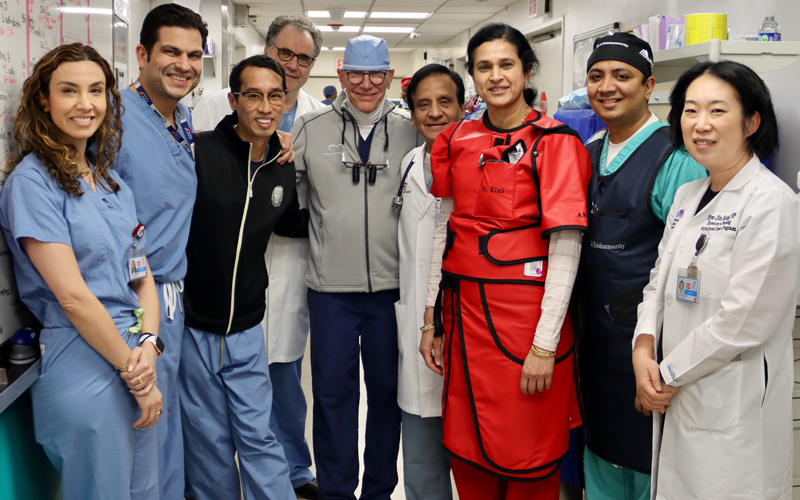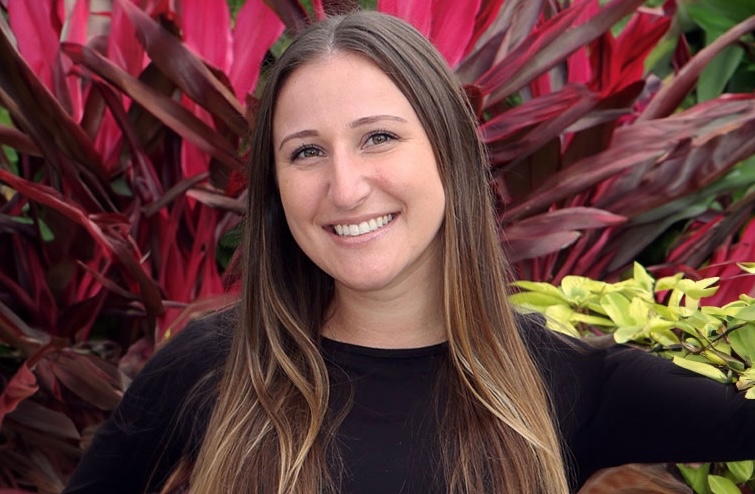Decades of advances in pediatric cardiology has allowed for children with congenital heart conditions to thrive, growing into adolescents and then adults capable of starting families of their own. Adult congenital heart disease patients should seek specialized care throughout their lifetime.
In this Q&A, Kali Hopkins, MD, Director for the Adult Congenital Heart Disease Transition Program at Mount Sinai Fuster Heart Hospital and Assistant Professor of Medicine and Pediatrics at the Icahn School of Medicine at Mount Sinai, discusses the importance of transitioning to an adult congenital cardiologist and continuing care to ensure that patients can lead long, healthy lives.

Kali Hopkins, MD
What are the different types of congenital heart disease?
Congenital heart disease is a condition that children are born with and can range from the very simple to very complex. Sometimes children need interventions or operations shortly after birth, and for others, we may simply monitor their condition.
On the simple side, there are atrial or ventricular septal defects, often termed “a hole in the heart,” which is a defect in the wall between the right and left chambers of the heart. These are very common defects and may or may not warrant treatment. More complex congenital heart conditions, include diagnoses like tetralogy of Fallot or transposition of the great arteries, which usually do require that the infant or child undergo surgery. Other more complex conditions include single ventricle heart disease, a condition that requires a series of operations to reroute the child’s bloodflow.
What treatments are available?
Sometimes infants or children born with congenital heart disease need interventions that are minimally invasive. An example would be a catheterization in which a tube is guided into the heart through the blood vessels for diagnosis or treatment. If there is a major problem, a child may need open-heart surgery.
Most patients with congenital heart disease will need to receive lifelong evaluation and treatment. More than 90 percent of children who are born with congenital heart disease survive into adulthood. It’s very important to understand that the treatments we now have are tremendously successful—and these children can grow up and lead typical adult lives. It is estimated that there are more adults with congenital heart disease than children living with the condition in the United States.
When should an adolescent with a congenital heart condition transition from their pediatric cardiologist to an adult congenital cardiologist?
It is very important that children and adolescents who are born with congenital heart disease continue to seek appropriate specialized care. Transition of care is an educational process which often should begin in the teenage years with the goal of the patient gradually taking over the responsibility of their care rather with the support of their caregiver. Sometimes, it takes multiple visits to have an adolescent patient appropriately prepared to transition to adult-based health care. Transfer of care, however, is the event of changing providers from a patient’s pediatric cardiologist to an adult congenital heart specialist. This should happen when they are older. There is no hard and fast rule, but by the time a patient is about 21 years old, they should be receiving care from an adult congenital cardiologist.
What kind of care should an adult congenital heart patient expect?
Often, patients go for many years without the need for any intervention. But adult congenital heart disease patients often require interdisciplinary care. There may be kidney, liver, or lung issues that come up as a result of the patient’s underlying condition or as they get older, patients tend to acquire adult-based health conditions like high blood pressure, diabetes, or coronary artery disease. It is also possible that there may never be a problem, but it is best to follow patients with congenital heart disease on a regular basis so that issues can be identified early.
We also have to think about the social fabric of their lives. Patients grow up and get jobs. They often move to another city or country; they get married and often want to have kids of their own. In doing so, they may pass the condition down to their own children. Young women with congenital heart disease may need to consult with a maternal fetal medicine specialist since some of these patients are considered higher-risk pregnancies. At the Mount Sinai Adult Congenital Heart Disease Center, we bring in a multi-disciplinary approach to meet the ongoing needs of patients as their lives change, including women with congenital heart disease who are pregnant or are considering pregnancy.
Are there lifestyle considerations that these patients should be aware of?
We always encourage our patients with congenital heart disease to try to have as normal a life as they can. When I see patients who are in their 20s and 30s, and they are doing well, I encourage them to enjoy life and have fun—within measure and with regular follow-ups. Exercise is an essential part of a healthy lifestyle, and we review any precautions that these patients should take. We want these young patients to go out there and live full lives, have careers and, when desired, their own families. We will be there throughout their journey.
What services does Mount Sinai provide for adult congenital heart patients?
Our adult congenital heart disease program at Mount Sinai is one of the few programs in New York that has been accredited through the Adult Congenital Heart Association. This accreditation confirms that we are providing comprehensive, multidisciplinary care to adolescent and adult patients with all forms of the condition.
What does accreditation mean?
It means that we offer all facets of care when it comes to adult congenital heart disease. At Mount Sinai Heart, we provide state-of-the-art care for all forms of congenial heart disease from adolescents to older adults. We can enlist the Mount Sinai Health System’s world-class physicians to provide multi-disciplinary care be it for pregnant women with the condition, evaluations for transplantation, or cardiac interventions in the catheterization lab or operating room. We also provide pulmonary hypertension evaluation and treatment, which is an important part of adult congenital heart disease care. We have a specialized cardiac imaging team here at Mount Sinai exclusively for congenital heart disease providing exceptional multi-modality imaging for our patients. We provide 360-degree care—complete and comprehensive with excellent outcomes.
Is there anything else that patients should know?
I urge adult congenital heart patients to find the right provider and stay in care—that is very important. We see many patients in their 20s and 30s and often they feel fine. At that stage, it is easy to fall out of care and not seek appropriate long-term care with an adult congenital cardiologist. But congenital heart disease is a condition that needs to be followed throughout their life. Find the right adult congenital heart disease program and make sure to follow your physician’s instructions. You’ve got a full life ahead of you and our job is to take you all the way.






